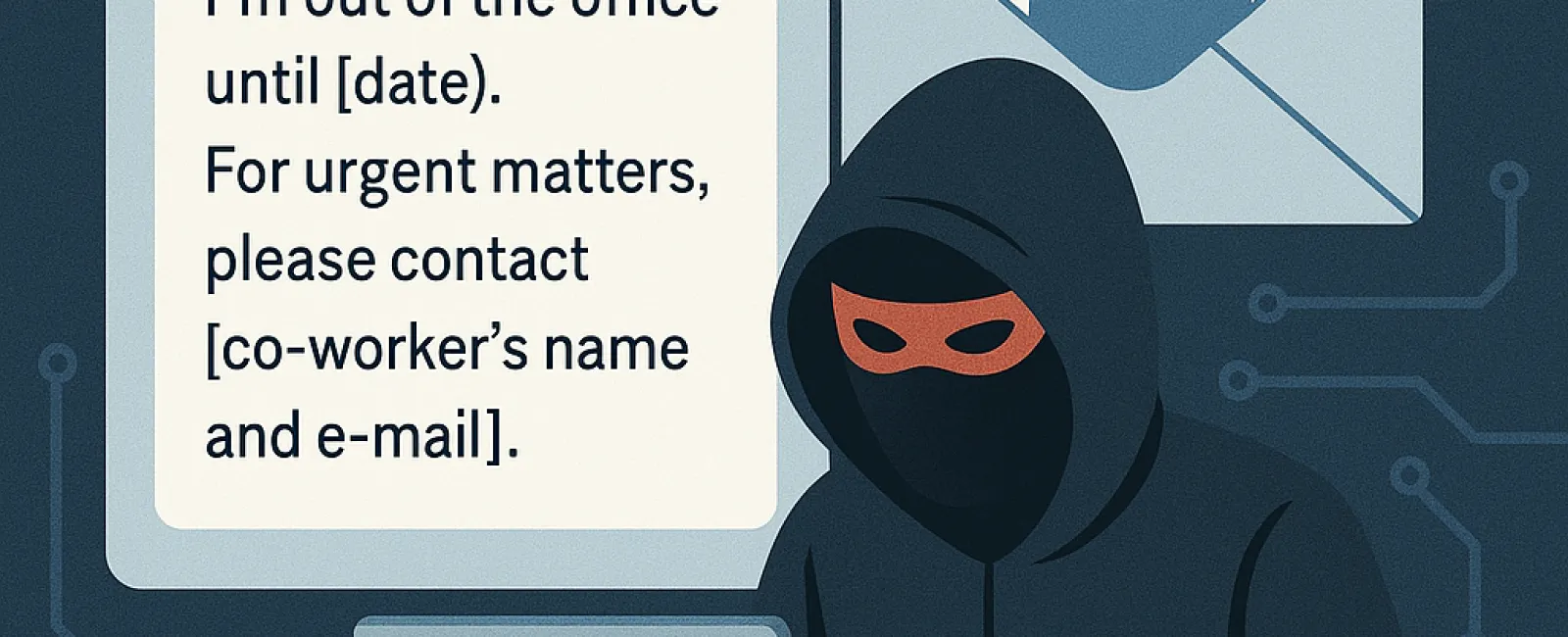June 16, 2025
Set your out-of-office reply and relax. But as you prepare for your vacation, beware: your inbox starts sending an automatic message that cybercriminals eagerly await:
"Hello! I'm away from the office until [date]. For urgent matters, please reach out to [coworker's name and e-mail]."
Seems harmless, even helpful, right?
Unfortunately, this is exactly the kind of information hackers crave.
Your simple auto-reply, designed to keep communication smooth, inadvertently hands over valuable details to cyber attackers seeking an easy entry.
Consider what a typical out-of-office message reveals:
● Your full name and job title
● Dates when you're unavailable
● Contact details of colleagues covering for you
● Insights into your team's internal structure
● Sometimes even reasons for your absence (e.g., "attending a conference in Chicago...")
These details give cybercriminals two critical advantages:
1. Perfect Timing: They know when you're away and less likely to detect suspicious activity.
2. Precise Targeting: They identify who to impersonate and whom to scam.
This creates an ideal setup for phishing scams or business email compromise (BEC) attacks.
How This Scam Unfolds
Step 1: Your auto-reply is triggered and sent.
Step 2: A hacker leverages it to impersonate you or the colleague listed.
Step 3: They send a fake urgent email requesting wire transfers, passwords, or confidential documents.
Step 4: Your coworker, unsuspecting, believes the request is genuine.
Step 5: Upon return, you discover unauthorized transactions, like a $45,000 payment to a "vendor."
These incidents happen more often than you'd expect and pose even greater risks for businesses with frequent travelers.
If your team includes traveling executives or sales staff, and others handle their communications during absences, this situation becomes a cybercriminal's playground:
● Admins manage emails from multiple sources simultaneously
● They routinely handle payments, sensitive documents, or urgent requests
● They act quickly, trusting the sender's identity without thorough verification
A single convincing fraudulent email can bypass defenses, leading to costly breaches or fraud.
Protect Your Business From Auto-Reply Exploits
Rather than eliminating out-of-office replies, the key is to use them smartly and implement protective measures. Consider these strategies:
1. Keep It Ambiguous
Avoid sharing detailed schedules or naming coverage contacts unless absolutely necessary.
Example: "I'm currently out of the office and will reply upon my return. For immediate help, please contact our main office at [main contact info]."
2. Educate Your Team
Ensure your employees understand:
● Never process urgent financial or sensitive requests based solely on email
● Always confirm unusual requests through a secondary channel, such as a phone call
3. Deploy Advanced Email Security
Use robust email filters, anti-spoofing technologies, and domain protections to reduce impersonation risks.
4. Enforce Multifactor Authentication (MFA)
Activate MFA on all email accounts to block unauthorized access even if passwords are compromised.
5. Partner With Proactive IT Security Experts
Collaborate with IT professionals who monitor login attempts, detect phishing, and identify unusual activities before damage occurs.
Enjoy Your Vacation Without Cybersecurity Worries
We specialize in building resilient cybersecurity defenses that protect your business—even when your team is out of the office.
Click Here or call us at 877-310-0123 to schedule your FREE 15-Minute Discovery Call. We'll assess your systems for vulnerabilities and guide you on securing your business so you can truly relax on vacation without fearing your inbox might betray you.





